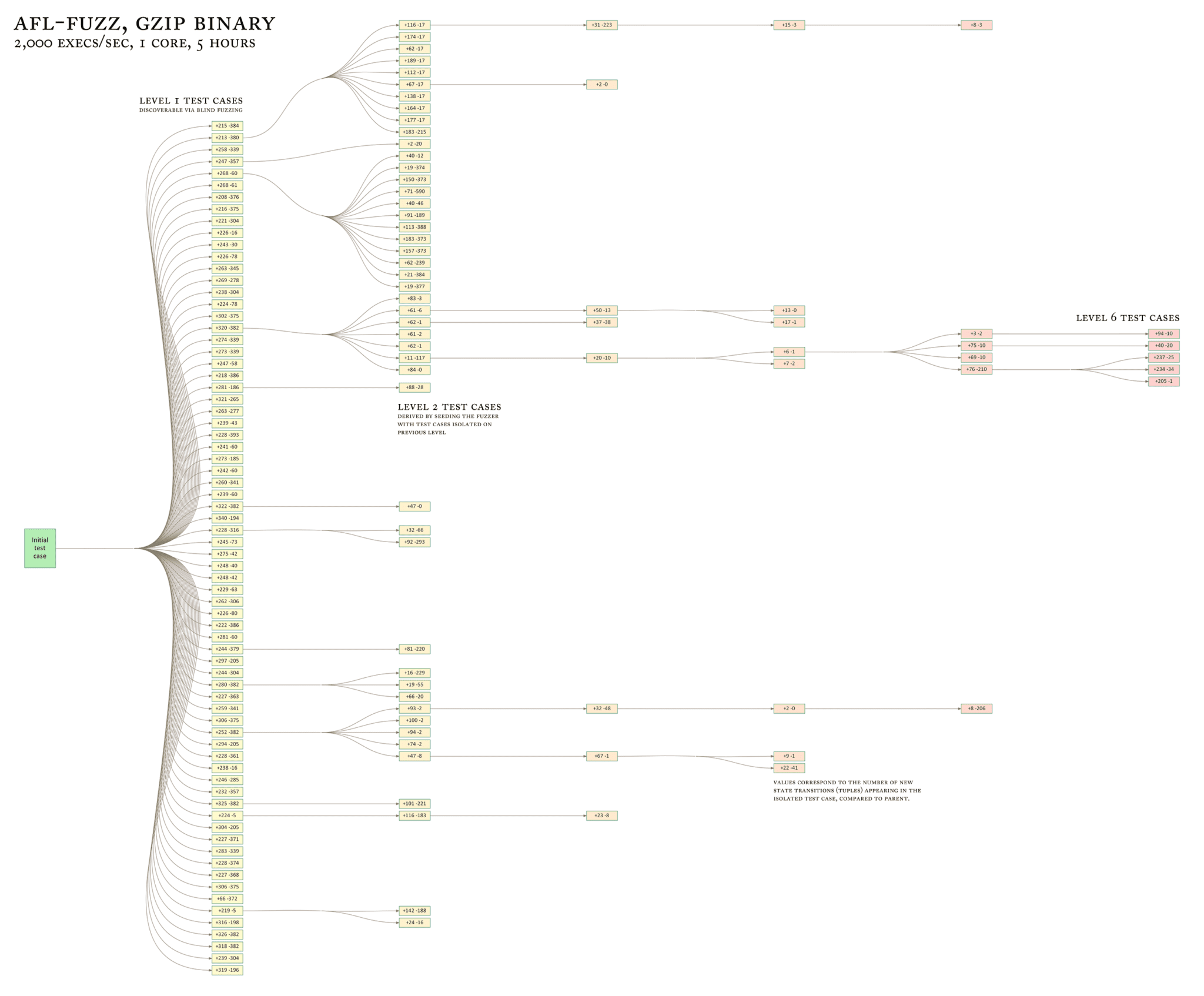
drAFL
Original AFL supports black-box coverage-guided fuzzing using QEMU mode.

Fuzzing is one of the most powerful and proven strategies for identifying security issues in real-world software; it is responsible for the vast majority of remote code execution and privilege escalation bugs found to date in security-critical software.
Unfortunately, fuzzing is also relatively shallow; blind, random mutations make it very unlikely to reach certain code paths in the tested code, leaving some vulnerabilities firmly outside the reach of this technique.
There have been numerous attempts to solve this problem. One of the early approaches – pioneered by Tavis Ormandy – is corpus distillation. The method relies on coverage signals to select a subset of interesting seeds from a massive, high-quality corpus of candidate files, and then fuzz them by traditional means. The approach works exceptionally well, but requires such
a corpus to be readily available. In addition, block coverage measurements provide only a very simplistic understanding of program state, and are less useful for guiding the fuzzing effort in the long haul.
Other, more sophisticated research has focused on techniques such as program flow analysis (“concolic execution”), symbolic execution, or static analysis. All these methods are extremely promising in experimental settings, but tend
to suffer from reliability and performance problems in practical uses – and currently do not offer a viable alternative to “dumb” fuzzing techniques.
The afl-fuzz approach
American Fuzzy Lop is a brute-force fuzzer coupled with an exceedingly simple but rock-solid instrumentation-guided genetic algorithm. It uses a modified form of edge coverage to effortlessly pick up subtle, local-scale changes to
program control flow.
Simplifying a bit, the overall algorithm can be summed up as:
1) Load user-supplied initial test cases into the queue,
2) Take next input file from the queue,
3) Attempt to trim the test case to the smallest size that doesn’t alter the measured behavior of the program,
4) Repeatedly mutate the file using a balanced and well-researched variety of traditional fuzzing strategies,
5) If any of the generated mutations resulted in a new state transition recorded by the instrumentation, add mutated output as a new entry in the queue.
6) Go to 2.
The discovered test cases are also periodically culled to eliminate ones that have been obsoleted by newer, higher-coverage finds; and undergo several other instrumentation-driven effort minimization steps.
As a side result of the fuzzing process, the tool creates a small, self-contained corpus of interesting test cases. These are extremely useful for seeding other, labor- or resource-intensive testing regimes – for example, for stress-testing browsers, office applications, graphics suites, or closed-source tools.
The fuzzer is thoroughly tested to deliver out-of-the-box performance far superior to blind fuzzing or coverage-only tools.
Instrumentation DLL
Instrumentation library is a modified version of winAFL’s coverage library created by Ivan Fratric.
Build
Step 1. Clone drAFL repo
git clone https://github.com/mxmssh/drAFL.git /home/max/drAFL cd /home/max/drAFL
Step 2. Clone and build DynamoRIO
git clone https://github.com/DynamoRIO/dynamorio mkdir build_dr cd build_dr/ cmake ../dynamorio/ make -j cd ..
If you have any problems with DynamoRIO compilation check this page
Step 3. Build coverage tool
mkdir build cd build cmake ../bin_cov/ -DDynamoRIO_DIR=../build_dr/cmake make -j cd ..
Step 4. Build patched AFL
cd afl/ make cd ..
Step 5. Configure environment variables and run the target
cd build mkdir in mkdir out echo "AAAA" > in/seed export DRRUN_PATH=/home/max/drAFL/build_dr/bin64/drrun export LIBCOV_PATH=/home/max/drAFL/build/libbinafl.so export AFL_NO_FORKSRV=1 export AFL_SKIP_BIN_CHECK=1 ../afl/afl-fuzz -m 500 -i in -o out -- ./afl_test @@
In the case of afl_test, you should expect 25-30 exec/sec and 1 unique crash in 2-3 minutes.
Copyright (C) 2018 mxmssh
Source: https://github.com/mxmssh/